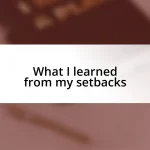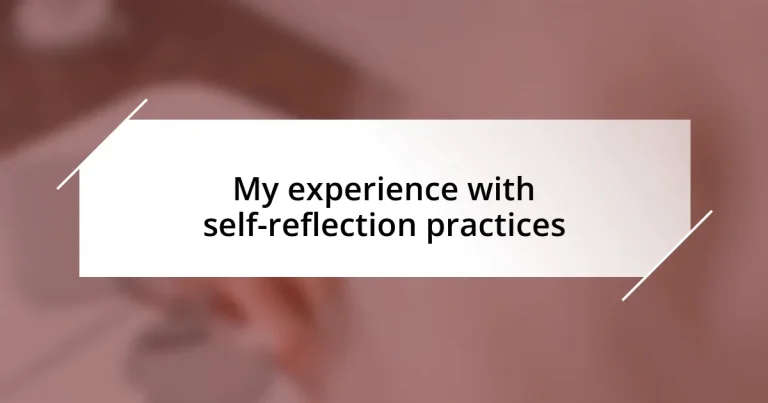Key takeaways:
- Self-reflection practices, like journaling and meditation, enhance personal growth and self-awareness by allowing time to process emotions and thoughts.
- Overcoming challenges in self-reflection involves facing uncomfortable truths, maintaining consistency with practices, and accepting that reflections do not need to be profound.
- Measuring the impact of self-reflection can be subjective but can involve tracking emotions and identifying patterns to foster intentional life changes.
- Integrating self-reflection into daily routines, through small moments like morning intentions or pauses during commutes, can lead to significant shifts in mindset and well-being.
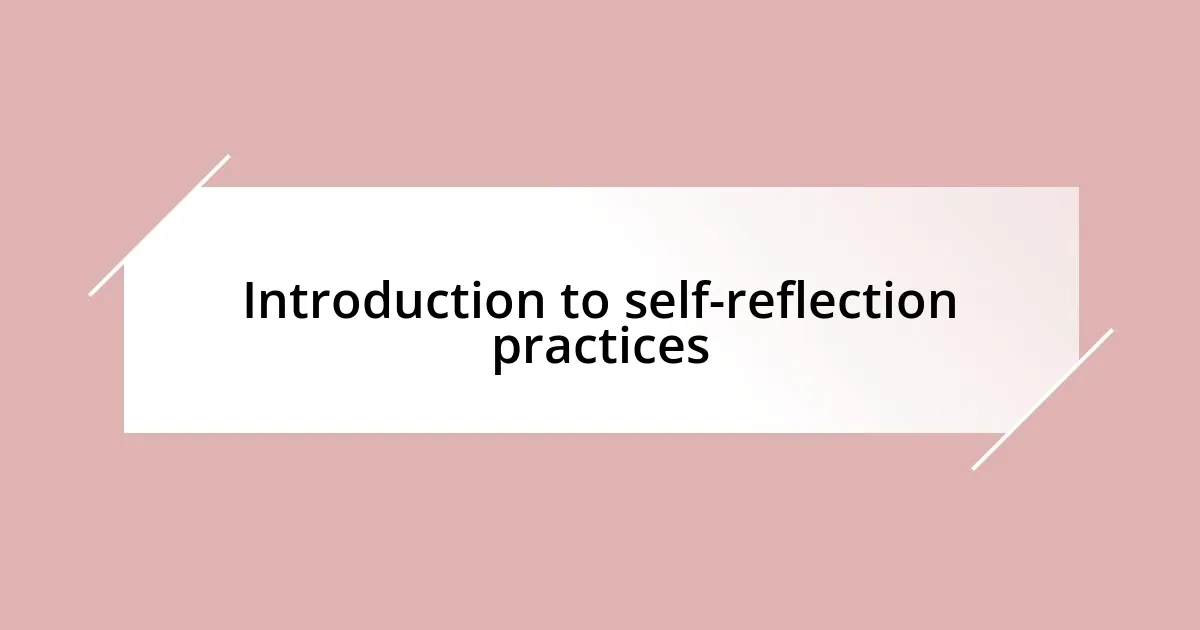
Introduction to self-reflection practices
Self-reflection practices are powerful tools for personal growth and self-discovery. I remember the first time I sat down to really think about my day and how it went. It was eye-opening to realize how my emotions influenced my decisions and interactions—had I been fully aware of them?
Engaging in self-reflection allows us to pause and consider what truly matters in our lives. Sometimes, I find myself overwhelmed by the chaos of daily tasks. In those moments, taking just a few minutes to write in my journal helps me sift through my thoughts and feelings, bringing clarity to why I react the way I do.
These practices can vary widely, from journaling and meditation to simply taking a quiet walk. For me, it’s often on these interactive walks that revelations emerge. How often do we give ourselves the space to just be? It’s in those still moments of contemplation that I’ve discovered my core values and fears, helping me align my actions with who I want to become.
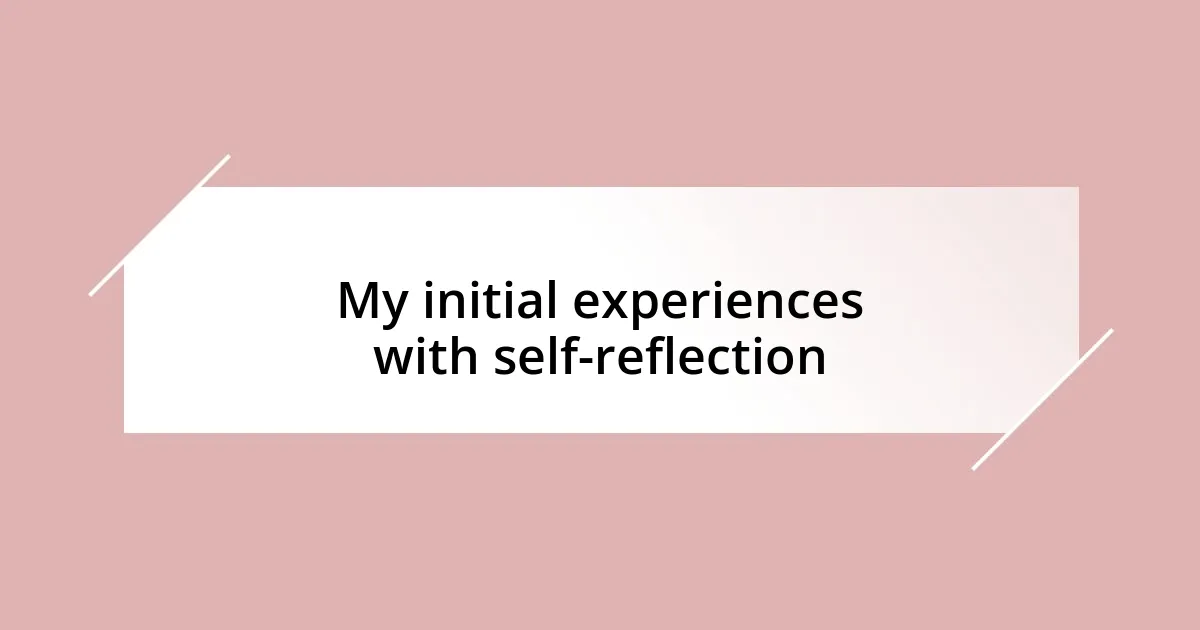
My initial experiences with self-reflection
The first time I engaged in self-reflection, I felt a mix of curiosity and apprehension. I decided to try journaling after a particularly challenging day at work. As I wrote, emotions I had brushed aside came bubbling to the surface—frustration, disappointment, and a surprising sense of relief. It was as if pen and paper unlocked a treasure chest of feelings I had tucked away, leading me to realize how often I neglected my true self.
- Journaling helped me articulate feelings I often kept hidden.
- I learned that allowing myself to feel without judgment was liberating.
- I started identifying patterns in my reactions, opening the door to greater self-awareness.
- I discovered a genuine need for more balance in my life, prompting shifts in my daily routine.
Reflecting on that experience, I see how self-reflection propelled me into a journey of intentional living. With each entry, I began to understand the stories I had been telling myself; some were limiting beliefs I was ready to challenge. In those initial moments of self-examination, it felt uncomfortable but necessary—much like a caterpillar breaking free from its cocoon.
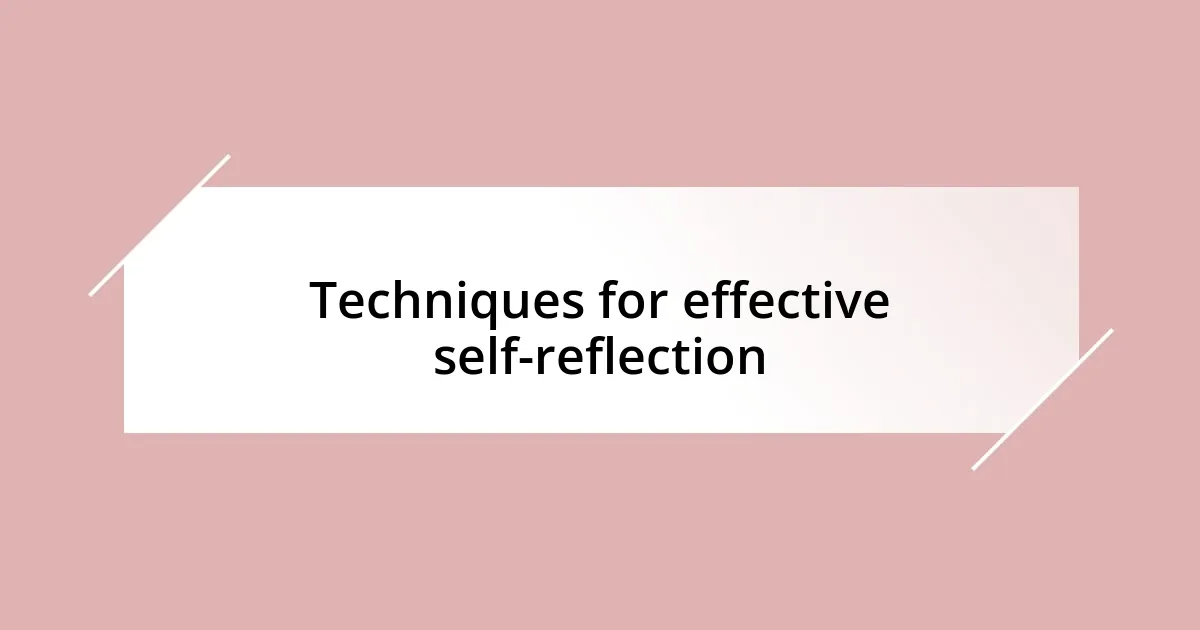
Techniques for effective self-reflection
Engaging in effective self-reflection is about finding techniques that resonate with us personally. One technique I often use is meditation, which allows me to delve deep into my thoughts without distractions. During those moments of stillness, I often uncover insights about my motivations that would otherwise remain hidden in the noise of daily life. Have you ever noticed how your mind feels more organized after a few minutes of quiet?
Another powerful method is mindfulness, which involves being present in the moment, especially during daily tasks. For instance, I find that when I do the dishes, I can reflect on my day, mulling over interactions and decisions I made. This simple activity transforms into a mini-retreat for my thoughts, allowing me to assess how I’ve responded to various situations. It’s a reminder that even mundane tasks can offer profound insights if we allow ourselves to reflect.
Lastly, engaging in conversations with trusted friends or mentors has been incredibly valuable for me. I recall a heartfelt discussion with a mentor who asked questions that challenged my perspective. It was through those exchanges that I recognized certain blind spots in my beliefs and behaviors, ultimately guiding me toward more deliberate life choices. Sharing our thoughts with others can illuminate aspects of ourselves we might overlook while in isolation.
| Technique | Benefits |
|---|---|
| Meditation | Promotes deep insights and clarity on motivations |
| Mindfulness | Encourages reflection during daily activities, making them meaningful |
| Conversations | Offers different perspectives and helps uncover blind spots |
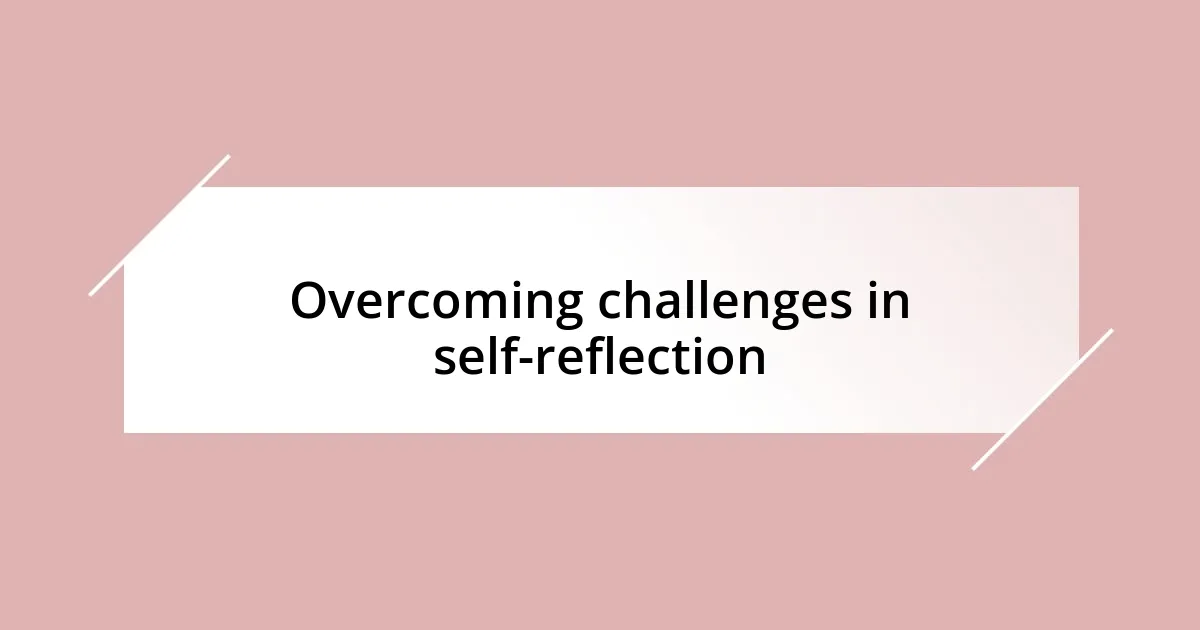
Overcoming challenges in self-reflection
One challenge I often faced in self-reflection was the fear of confronting uncomfortable truths. I remember a particular moment when I finally sat down to revisit my past decisions. As I reflected, I felt a tightness in my chest; the reality of my choices weighed heavy. But I realized that this discomfort was a sign of growth. Have you ever felt unease while facing your own truths? It’s a natural part of the journey.
Another hurdle I encountered was staying consistent with my self-reflection practice. There were days when life got too busy, and I’d skip journaling or meditation. I learned that setting small, achievable goals, like reflecting for just five minutes, made all the difference. It’s amazing how even the briefest moments can spark a wave of clarity. Have you noticed how small steps can lead to significant changes?
Lastly, I sometimes struggled with the notion that my reflections had to be profound or poetic. There were days when my thoughts felt scattered and mundane. I discovered that even the simplest reflections could hold immense power. One day, a fleeting thought about a friendly sunset led me to appreciate the beauty in everyday moments. This taught me that self-reflection is less about monumental insights and more about embracing the journey, with all its variations. What small moments have guided you on your own path of reflection?
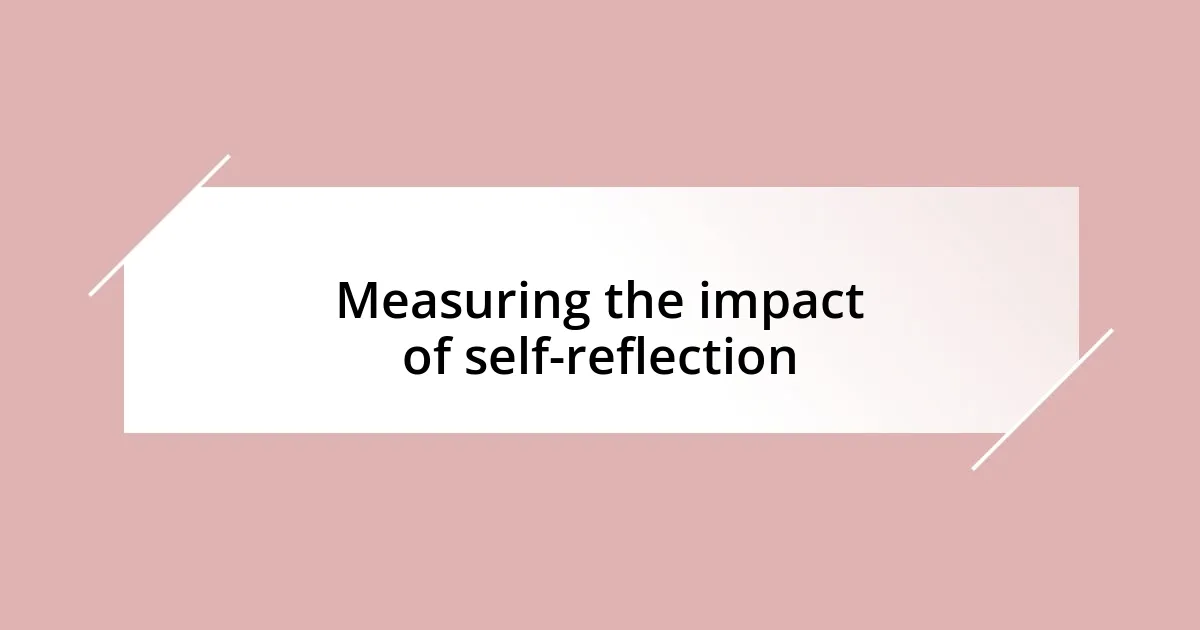
Measuring the impact of self-reflection
Measuring the impact of self-reflection can be quite subjective; it deeply resonates with our personal experiences. For me, I noticed significant shifts in my emotional well-being after committing to a regular practice. When I began tracking my feelings and thoughts over weeks, I realized how much my perspective changed. I asked myself, “What did I learn from that situation?” This simple question turned into a valuable tool for growth.
In another instance, I decided to quantify my reflections by journaling. I created a system where I rated my emotional state daily on a scale of one to ten. This approach not only provided me with tangible metrics but also sparked curiosity about patterns in my emotions. What stood out to me was how certain experiences would elevate or diminish my mood, which helped me make intentional changes in my life, including reducing toxic interactions and fostering positive ones.
Ultimately, there’s a profound sense of empowerment that comes from recognizing the evolution of our thoughts. While it’s tempting to seek confirmation through external validation, I found that my greatest breakthroughs often came from the personal acknowledgment of growth. Have you ever felt a similar strength in understanding how far you’ve come? That realization often proves to be a significant driver in maintaining my self-reflection practices.
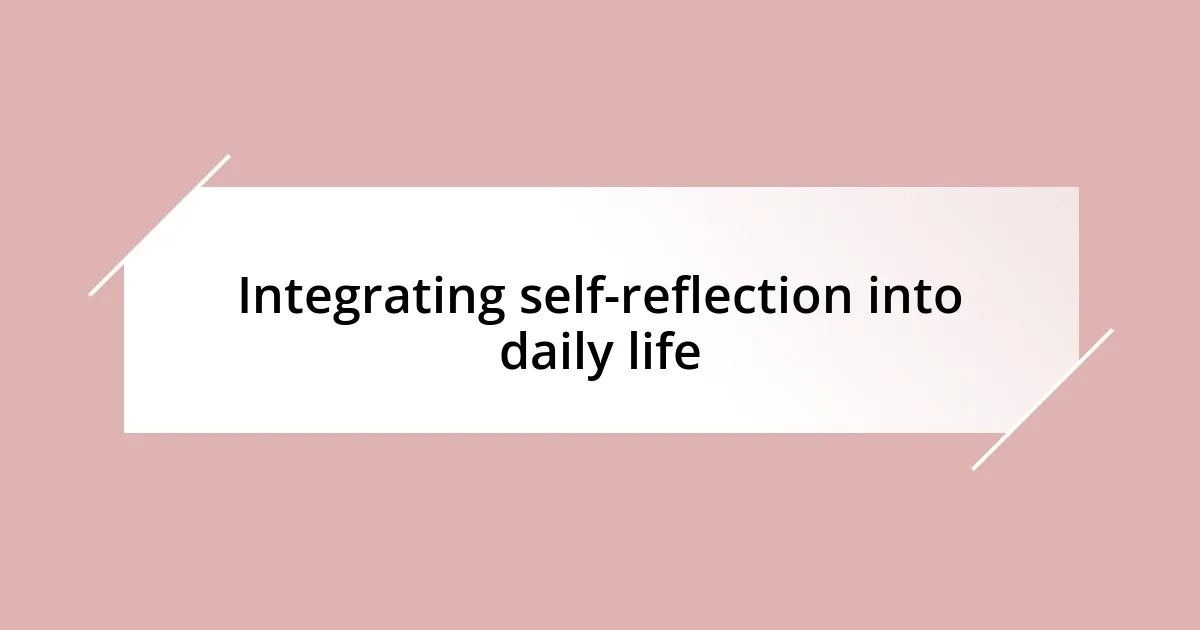
Integrating self-reflection into daily life
Integrating self-reflection into daily life can be simple yet powerful. I found that incorporating brief moments of reflection, like during my morning coffee, transformed my routine. As I took those first sips, I’d ponder my intentions for the day, and I realized this small practice set a positive tone. Isn’t it fascinating how a little mindfulness can shift our entire day?
One technique I embraced was using sticky notes. I would jot down a thought or question, like “What am I grateful for today?” and place it on my bathroom mirror. Seeing those reminders first thing in the morning nudged me toward introspection throughout my day. It’s amazing how these small prompts can gently steer your mindset without feeling overwhelming, don’t you think?
I also learned to weave self-reflection into my commute. Instead of scrolling through my phone, I’d allow my mind to wander over the events of my day. This downtime was invaluable, as it provided a mental space to process my thoughts and feelings. I sometimes questioned whether I was using my commute effectively, and I discovered that it was during these silent moments that I often found clarity. What if we all gave ourselves permission to just think during those transitions?



